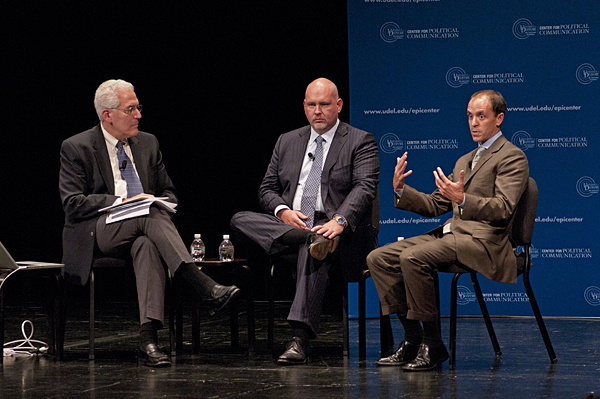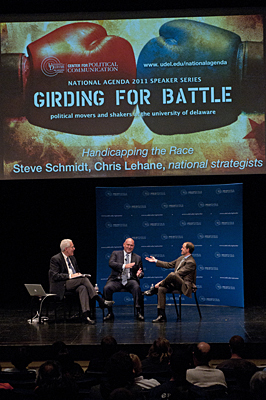Presidential politics : National Agenda 2011: Steve Schmidt and Chris Lehane on presidential politics
Top political consultants handicap the 2012 presidential election

1:58 p.m., Sept. 29, 2011–Handicapping the 2012 presidential race is problematic, two leading political consultants told a National Agenda speaker series audience Wednesday night in Mitchell Hall, because a potential game changer — Chris Christie, the Republican governor of New Jersey and a University of Delaware alumnus — remains on the sideline.
The consultants, Republican Steve Schmidt, also a UD alumnus, and Democrat Chris Lehane, said that as it stands now the race would appear to be between incumbent President Barack Obama, seeking a second term, and either of the Republicans Rick Perry, governor of Texas, or Mitt Romney, former governor of Massachusetts.
However, both said a Christie candidacy could change the political landscape dramatically.
“If he jumps into the race, it scrambles the card,” said Schmidt, a top political strategist for the 2008 presidential campaign of U.S. Sen. John McCain, adding that if he declares Christie would likely become the Republican front runner.
Schmidt said that beyond Christie’s appeal to GOP voters, “I think he would be a very effective candidate in the general election.”
Citing Christie’s speech on Tuesday at the Ronald Reagan Presidential Library and Museum, Schmidt said that in a period of negativism the governor offers the promise of new ideas and “a vision for moving the country forward.”
Lehane agreed that a Christie candidacy would be a “game changer” as the one Republican who can articulate a positive message. He did say that it takes someone of unusual ability to make the leap to the national stage without previous experience at that level. “You are going from Little League to Game 7 of the World Series, where they throw 100 miles per hour at your head.”
Schmidt said a Christie run could put Democrats, who will be counting on a strong showing in the northeast, on the defensive by having to shift resources to that region. And Lehane said the 49-year-old Christie could potentially appeal to the younger demographic on which Obama relies.
Whether to run is a tough choice, Schmidt said, because “the bus of opportunity may only stop once.”
Ralph Begleiter, moderator of the National Agenda series and director of UD’s Center for Political Communication, noted that a Christie run would create “visions of sugarplums” for the University, given that Vice President Joseph R. Biden, Jr., and wife Jill Biden are both UD graduates, as well.
Asked if the direct and self-assured Christie might consider a space on the Republican ticket as a vice presidential candidate, Schmidt said, “He doesn’t seem like a second chair kind of guy,” to much laughter.
Even without a Christie candidacy, Obama faces a difficult challenge in the 2012 election, the consultants agreed. Lehane noted that no president other than Franklin Delano Roosevelt has been re-elected in such difficult economic times, with Schmidt adding that none has been re-elected with an unemployment rate above 7 percent. The August 2011 rate was 9.1 percent.
This will not be a “hope and change” campaign, Schmidt said, agreeing with columnist Peggy Noonan that Obama cannot win the election but the Republicans can lose it.
Schmidt added that the American public might want to buckle up because he believes this could be one of the “meanest campaigns any one in the United States has ever lived through” because the only way to win in a generally difficult environment is to “disqualify your opponent.”
He also said each side will probably spend upwards of $1 billion in the 2012 campaign.
Lehane said Obama can win re-election because he does have strengths — people generally trust him and believe him to be both capable and smart. But to excite the electorate, he said the president needs to provide the nation a “big idea” about where Americans as a people are going.
“For Obama to win, he has to impose his will on the campaign,” he said.
If the campaign turns on the issue of trust, Lehane said Perry and Romney both have potentially fatal flaws, with Perry somewhat of a loose cannon who might not pass the “Dr. Strangelove test” and Romney having been CEO of a company that made money by downsizing and relocating jobs.
To date, the Republican process has too much resembled a “reality show,” Schmidt said. He said Perry’s best day was the one before he announced his candidacy and that while his campaign is not nose-diving, it does appear to be losing altitude.
Schmidt said Romney is a much-improved candidate since his 2008 bid, has been effective during the Republican debates and would be a worthy opponent in the general election.
The state of politics

Lehane said both he and Schmidt have seen much troubling polling data about a crisis in confidence on the part of the American public about their institutions and about whether the “American dream” will continue to exist for the next generations.
There has been a “total collapse of trust” in every institution in the country except for the military, Schmidt said.
Schmidt also cited a loss of civility in politics, where politicians once referred to opponents as just that, not as enemies, wondering aloud it that is because earlier politicians — although of differing views — fought side by side in foxholes against enemies that were very real threats to freedom and democracy. “That has been lost,” he said.
Both speakers expressed concern over the rise of big money, high power, non-transparent ideological organizations that are exerting great influence over politics and decisions.
National Agenda series
The 2011 National Agenda speaker series, sponsored by the Center for Political Communication, is titled “Girding for Battle: Political Movers and Shakers at the University of Delaware.”
National Agenda lectures are held at 7:30 p.m., Wednesdays, continuing through Nov. 16. Lectures are held in Mitchell Hall and moderated by Ralph Begleiter, director of the Center for Political Communication.
The series will continue Wednesday, Oct. 5, with Pamela Constable of The Washington Post discussing the war in Afghanistan; Oct. 19, with political ad campaigners Joe Slade White and Valerie Biden Owens; Nov. 2, with political watchdog Melanie Sloan; and Nov. 16, with New Jersey Gov. Chris Christie.
Article by Neil Thomas
Photos by Duane Perry
